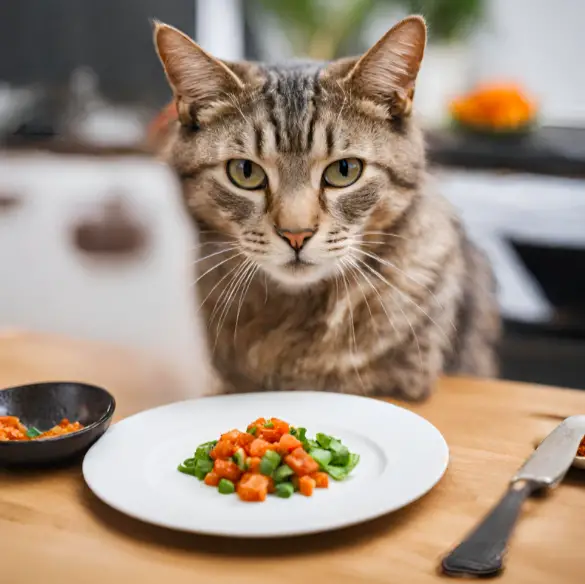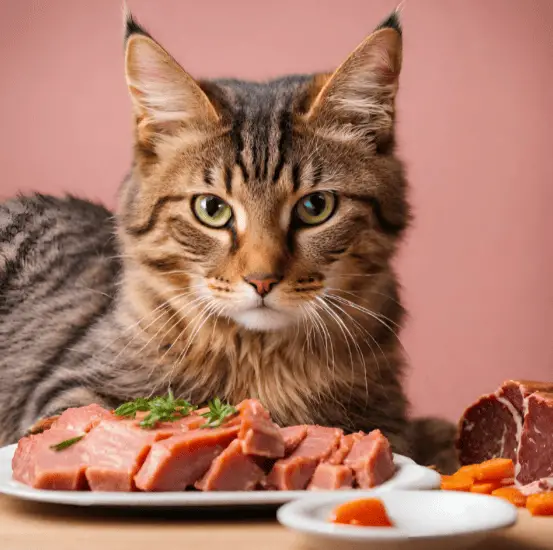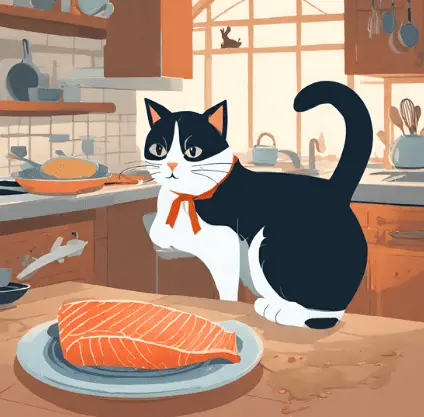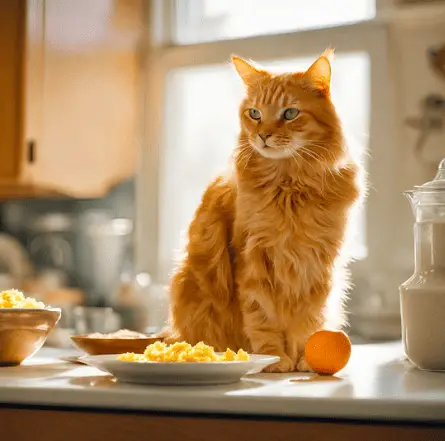
Are you wondering if home-cooked food is better for your cat? While commercial cat food is convenient, some pet owners argue that homemade meals provide more nutritional benefits. In this article, we will explore the debate over cat nutrition and weigh the potential risks and benefits of home-cooked food.
By understanding the nutritional needs of cats and evaluating the quality of commercial cat food, you can make an informed decision about what is best for your feline friend.
KEY TAKEAWAY
Is home cooked food better for cats?
Home-cooked cat meals can be healthy if well-balanced, but consult with a vet to ensure your cat’s specific dietary needs are met.
The Debate Over Cat Nutrition
Do you believe that commercial cat food provides all the necessary nutrients for your feline friend? Well, the debate over cat nutrition has been a topic of discussion among pet owners and experts for quite some time. While commercial cat food is formulated to meet the nutritional needs of cats, there are some concerns about its adequacy.
One of the main concerns is the quality of ingredients used in commercial cat food. Many brands use fillers and by-products, which may not provide the same level of nutrition as whole, fresh ingredients. Additionally, some cats may have specific dietary needs or health conditions that require a more tailored diet, which may not be met by commercial options.
Furthermore, studies have shown that home-cooked food for cats can offer certain benefits. By preparing meals at home, you have control over the ingredients used and can ensure that your cat receives a balanced and nutritious diet. Home-cooked food can also be customized to meet the specific needs of your cat, such as incorporating more protein for muscle development or reducing certain ingredients for cats with allergies.
In the next section, we’ll explore the benefits of home-cooked food for cats and how it can be a viable alternative to commercial cat food.
Benefits of Home-Cooked Food for Cats
If you want to ensure that your cat receives a balanced and nutritious diet, it’s important to consider the benefits of home-cooked food. Many cat owners are opting for home-cooked meals as a way to provide their feline friends with a more natural and wholesome diet. The benefits of home-cooked food for cats are supported by scientific evidence and can have a positive impact on their health.
One of the main advantages of preparing meals for your cat at home is the ability to control the quality of ingredients. Commercial cat foods often contain fillers, artificial additives, and low-quality protein sources. By cooking for your cat, you have the opportunity to use high-quality ingredients such as lean meats, fish, and fresh vegetables. This can help ensure that your cat receives the necessary nutrients for optimal health.
Home-cooked diets also allow for customization based on your cat’s specific dietary needs. Cats are obligate carnivores, meaning they require a diet high in animal protein. By preparing meals at home, you can ensure that your cat’s protein needs are met while also addressing any allergies or sensitivities.
It is important to note that home-cooked diets should be formulated under the guidance of a veterinary nutritionist to ensure they’re complete and balanced. This helps prevent nutrient deficiencies or excesses that can lead to health issues.
Potential Risks of Home-Cooked Food for Cats
To ensure the health and well-being of your cat, it’s crucial to be aware of the potential risks associated with feeding them home-cooked food, such as nutrient imbalances and foodborne illnesses. While many cat owners may believe that homemade meals are a healthier alternative to commercial cat food, it’s important to understand the potential drawbacks.
One of the main concerns with home-cooked cat food is the risk of nutrient imbalances. Cats have specific dietary requirements that must be met to maintain optimal health. Homemade meals may not provide the necessary balance of proteins, fats, vitamins, and minerals that cats need. This can lead to deficiencies or excesses, which can have serious health implications.
Additionally, there’s a higher risk of foodborne illnesses when feeding cats home-cooked food. Raw or undercooked meats, which are often used in homemade cat meals, can contain harmful bacteria such as Salmonella or E. coli. These bacteria can cause gastrointestinal issues and potentially lead to more severe conditions.
Understanding the nutritional needs of cats is essential in providing them with a balanced diet. Transitioning to a home-cooked diet should only be done under the guidance of a veterinarian or a veterinary nutritionist who can ensure that all necessary nutrients are being met.
Understanding the Nutritional Needs of Cats
You should prioritize understanding your cat’s nutritional needs and, therefore, provide them with a balanced diet that meets their specific requirements. Cats are obligate carnivores, meaning their diet should primarily consist of animal-based proteins. They require essential amino acids such as taurine, which is found in animal tissues but is absent in plant-based foods. Cats also need certain vitamins, minerals, and fatty acids that are abundant in meat. It’s crucial to provide a diet that includes high-quality protein sources, such as chicken or fish, to maintain optimal health.
Furthermore, cats have specific dietary requirements for other nutrients, such as vitamin A, arachidonic acid, and arginine. Vitamin A is essential for vision, growth, and immune function. Arachidonic acid is a fatty acid that cats can’t synthesize and must obtain from their diet. Arginine is an amino acid that plays a vital role in removing waste products from the body and maintaining healthy blood vessels.
Understanding these nutritional needs will help you choose the right cat food. The next step is evaluating the quality of commercial cat food available in the market.
Evaluating the Quality of Commercial Cat Food
You should regularly assess the quality of commercial cat food to ensure that it meets the nutritional needs of your feline companion. While it may be convenient to rely on commercial cat food, it’s important to remember that not all cat foods are created equal.
Here are three key factors to consider when evaluating the quality of commercial cat food:
- Ingredients: Look for cat foods that list high-quality protein sources, such as chicken or fish, as the primary ingredient. Avoid products that contain fillers, by-products, or artificial additives, as these may not provide the necessary nutrients for your cat’s health.
- Nutritional Balance: Cats have specific dietary requirements, including the need for amino acids like taurine and essential fatty acids like omega-3s. Ensure that the cat food you choose meets these nutritional needs, as deficiencies can lead to serious health issues in your cat.
- Manufacturing Standards: Consider the reputation and track record of the cat food manufacturer. Look for brands that follow industry standards and have a good history of producing safe and high-quality products.
Tips for Creating Balanced Homemade Meals for Cats
Cooking homemade meals for your cat can be a beneficial way to ensure they receive a balanced diet, as you can control the ingredients and portion sizes more effectively. When creating homemade meals for your cat, it’s important to consider their nutritional needs.
Cats are obligate carnivores, meaning they require a diet that’s high in animal protein. This can be achieved by including lean meats such as chicken or turkey in their meals. In addition to protein, cats also need essential nutrients like vitamins, minerals, and fatty acids. You can provide these by including vegetables, such as carrots or peas, in their meals.
It’s important to note that certain ingredients, like onions or garlic, can be toxic to cats and should be avoided. When preparing homemade meals, it’s crucial to consult with a veterinarian or a veterinary nutritionist to ensure your cat’s specific dietary needs are being met. They can provide guidance on the appropriate portion sizes and additional supplements that may be necessary.
Making the Best Choice for Your Cat’s Nutrition
Considering the nutritional needs of your cat is essential when making the best choice for their nutrition. Cats are obligate carnivores, which means their bodies are designed to thrive on a diet that’s primarily meat-based. When deciding on the best food for your feline friend, keep the following in mind:
- High-quality protein: Cats require a diet rich in animal-based protein for optimal health. Look for cat food that lists a high-quality protein source, such as chicken or fish, as the first ingredient. This will ensure that your cat is getting the essential amino acids they need.
- Essential nutrients: Cats have specific nutrient requirements, including vitamins, minerals, and fatty acids. Choose cat food that’s formulated to meet these needs, and consider consulting with your veterinarian to ensure your cat is getting all the necessary nutrients for their overall well-being.
- Moisture content: Cats have a low thirst drive and are prone to urinary tract issues. Providing moisture-rich food, such as wet cat food or adding water to dry kibble, can help prevent dehydration and promote urinary health.
By considering these factors and selecting a high-quality, balanced cat food, you can ensure that your cat is receiving the necessary nutrition for a healthy and happy life.
Remember to consult with your veterinarian for personalized recommendations based on your cat’s specific needs.
Conclusion
In conclusion, when it comes to cat nutrition, the debate between home-cooked food and commercial cat food continues. While there are benefits to providing homemade meals, such as control over ingredients and potential cost savings, there are also risks if the meals aren’t balanced.
Understanding the nutritional needs of cats and evaluating the quality of commercial cat food are key. Ultimately, making the best choice for your cat’s nutrition requires careful consideration and consultation with a veterinarian.

Stephanie Ansel is a well-known writer and journalist known for her unique and captivating writing style. She has written many articles and books on important topics such as the lifestyle, environment, hobbies, and technology and has been published in some of the biggest newspapers and magazines. Stephanie is also a friendly and approachable person who loves to talk to people and learn about their stories. Her writing is easy to read and understand, filled with lots of details and information, and is perfect for both kids and adults who want to learn about important topics in an interesting way.





